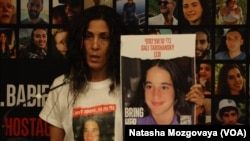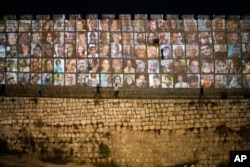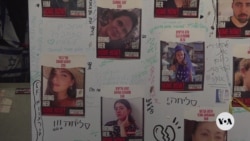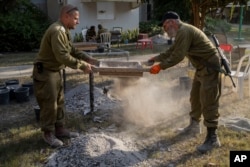Sexual violence can be an instrument of power in warfare, and female hostages face unique risks, warns a new report submitted to the International Committee of the Red Cross by a medical team working with the families of those kidnapped by Hamas.
In Israel, photos of those abducted by Hamas to Gaza are everywhere — from the Ben Gurion Airport arrivals corridor and the huge posters along the highways to kids’ shop windows, lampposts, benches and T-shirts. On the wall full of photos at the Tel Aviv Museum of Art Square, renamed “the Kidnapped Square,” where many protest events have been held since the October 7 attack, people can express their feelings in writing.
A frequent word written next to the pictures of children and teenage girls is “I am sorry.” Relatives of the girls or young women say they feel helpless and anxious about their condition, being aware of the additional risks faced by females in captivity.
Israeli believes 239 hostages are being held by Hamas in Gaza. About 100 of them are women. About a third of them are under the age of 18.
Call for intervention
The report, submitted to the ICRC Monday by a team of medical experts who work with The Hostage and Missing Families Forum, a volunteer group created less than 24 hours after the October 7 attacks, asks for intervention on behalf of the female captives. It lists some of the women’s pre-existing medical conditions, ranging from heart disease and diabetes to asthma, and warns that female hostages in violent conflicts face the additional risk of sexual abuse with long-term physical and mental consequences.
In Hamas' attack on Kibbutz Be’eri, Reuma Arosi Tarschansky lost her 15-year-old son Lior. Her teenage daughter Gali was taken to Gaza. At the press conference presenting the report in Tel Aviv, she said that for over a month, she didn’t get any information about her daughter’s current condition.
“Gali is 13. She is a teenage girl,” said Arosi Tarschansky. “My biggest nightmares at night are related to this subject. Puberty age, the changes she is going through, she is alone there. I don’t know what they did to her.”
She pleaded for help from global women's organizations, as well as “any woman, girl, teenager, mother, sister, whoever hears me, to act for the kidnapped women, the kidnapped teenagers, and my Gali.”
Professor Ruth Halperin-Kaddari, an Israeli legal scholar with Bar Ilan University and an international women's rights advocate, says sexual violence against women has been part of violent conflict in many parts of the world.
“The body of women is very often taken as a symbol of the body of the nation, and so violating the woman is actually violating the whole nation of the enemy,” she said. “They are more susceptible to these forms of crimes and international law. United Nations and the ICC recognized that conflict-related sexual violence is a special form of war crime and crimes against humanity.”
Hamas, she added, built violence against civilians into their plan of attack — as well as publicizing it, to inflict terror on the rest of the population.
Halperin-Kaddari was appalled by what she considers the gap between the acts of brutality broadcast by Hamas on social media — including assault and humiliation of the bloodied captive women — and the reaction of the international human rights bodies which, she believes, did not make a forceful statement against these acts perpetrated by Hamas.
The professor also said that communities advocating for women’s and human rights have “betrayed their prime duty — to respect, protect and promote the rights of all human beings.”
“All of them resorted to the conventional symmetry, addressing the suffering of both sides of the conflict,” said Halperin-Kaddari. “And I want this to be clear — I am not for a moment denying the suffering of women and children, of innocent civilians in Gaza. But what happened on October 7 stands out, and it should be acknowledged. It should be recognized as a crime against humanity of the most cruel form ever committed in modern history.”
Israel’s Police Lahav 433 National Crime Unit is conducting investigations into sexual assaults conducted by Hamas, based on the video recordings, captured organization members' investigations, testimonies of survivors, forensic evidence, and rescue and recover volunteers’ testimonies.
They released testimony by one of the survivors of the Supernova musical festival where at least 260 people were killed, describing the rape and subsequent execution of a young woman.
Twenty-three-year-old Romi Gonen was one of the festival attendees who was taken into Gaza. Her sister Yarden said that for more than four hours following the beginning of the Hamas attack, over several phone calls from Romi, her family followed with horror her failed attempt to escape, her best friend getting murdered next to her, and her abduction to Gaza.
“The last call was with my mother for 40 minutes,” Yarden Gonen said. “We have a recording of 25 minutes at the end of the recording, you can hear Hamas terrorists talking about her, that she's alive, that they don't need to kill her. ‘Take her with you’ — ‘No, I don't want to take her.’ ‘Okay. I'll take her — like she's a doll or a bag.”
Gonen breaks down when she talks about the silence of U.N. women’s organizations, such as the U.N. Committee on the Elimination of Discrimination Against Women, that she says have not raised their voices to call for the release of the Israeli hostages.
“I believed that if [women] unite against the horrible things that could happen to us, we can stop them,” she said. “Where are you? How could you leave us alone? How could you leave my sister alone? Why couldn't you speak up?”
In a recent public statement, the U.N. committee called for a cease-fire in Gaza and expressed “deep concern that the human rights of women and children in Gaza ... have been seriously violated” but did not mention the massacre of Israelis or the hostages.
Gonen mentioned her sister’s health conditions that require treatment, including asthma, for which she uses inhalers, but said the risk of sexual violence, based on the videos of the October 7 attack, is equally horrifying.
“One of her conditions is that she's attractive,” she said. “She's over there for 38 days. All I know is that they shot her in her hand during the first attack on the car that she tried to run away with. And I don't know anything else. Every minute someone can do harm her. What is stopping them from doing that? They did it on October 7 to so many women."









